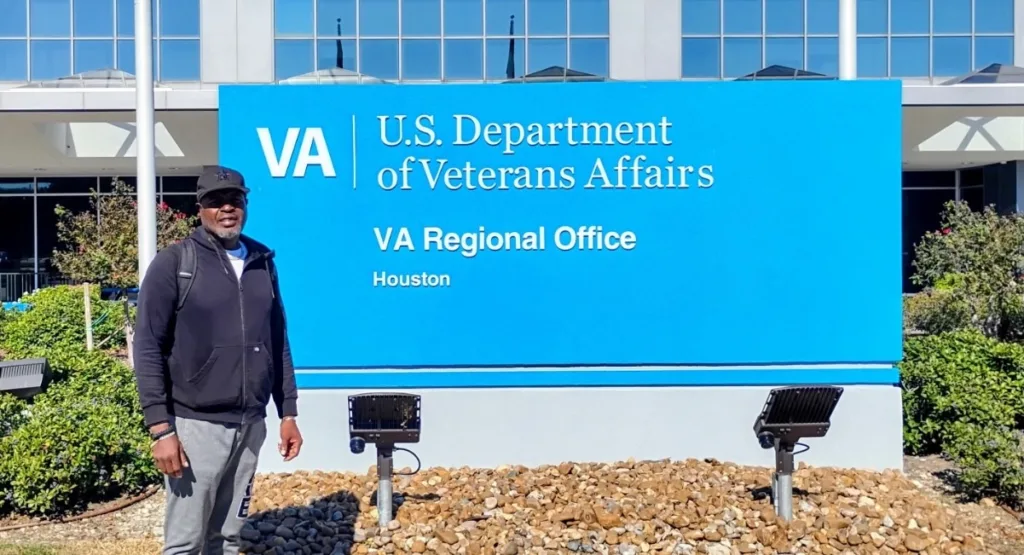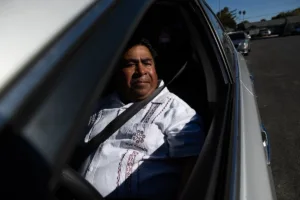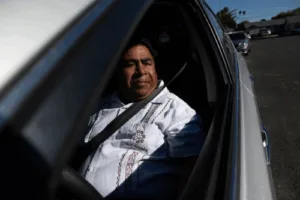By N.C. Greene
Nov 3, 2025
Houston has built an effective model that keeps people like Navy veteran Aaron Cooper off the streets. Federal cuts are now threatening that vital work.

Navy veteran Aaron Cooper in front of the USVA regional office in Houston, Texas. Cooper is among those who rely on services now threatened by cuts to federal funding.
HOUSTON – When Aaron Cooper walked out of Texas state jail four weeks ago after serving an eight-month sentence, freedom didn’t bring balloons — it brought grief. He was released one day before the funeral of his uncle, Michael Andrea Rice, whose remains were found in Buffalo Bayou — one more name among the nearly two dozen bodies surfacing in Houston’s waterways this year, and the unanswered questions about how they got there.
Cooper knows the bayou banks, the bridge shadows, and the places where people look away rather than confront the crisis. He knows “The Wallet” downtown — the stretch where Houston’s homeless go for resources, day labor, loose change, and whatever mercy the day might offer. He knows the whispered “Tramp Trail,” an invisible route linking survival pockets across the city, and the “tent cities” tucked under overpasses and behind warehouses.
He knows the danger too. A few years ago, Cooper was stabbed 10 times during an altercation with another homeless man — an attack that left him in a coma for nearly two weeks. Now, sitting in a family member’s home instead of returning to the streets, he’s trying to understand what claimed his uncle’s life — while fighting to reclaim his own.
A Navy veteran, Cooper carries Post-Traumatic Stress Disorder (PTSD) and a Traumatic Brain Injury (TBI) from his time in service. The drinking came later — not as recreation, but as anesthesia.
“I wouldn’t say I was an alcoholic. I’d say I battled alcohol,” Cooper explained. “A lot of times I didn’t even want to drink. But I liked the burn going down my throat. I’m not gonna pull the wool over your eyes. I was all messed up.”
His trauma ate through a life that once held promise — a job, a loving woman, children, stability — and one by one, they slipped away.
On Nov. 16, 2009, the former head of household found himself without one. The self-described germophobe hit the streets, keeping his appearance impeccably clean — refusing to “look homeless” — while sleeping on what he called his “Cement Posturepedic.”
Today, what he wants is simple:
A door.
A key.
A way back to himself.
A hand up, not a handout.
And he is not alone.
A National Emergency — and a Houston Blueprint
Across America, homelessness is at the highest level ever recorded — 771,480 people on a single night in 2024, according to the U.S. Department of Housing & Urban Development.
Nearly 150,000 were children. Black Americans represent 32% of unhoused people, despite making up only 12% of the population.
Veterans are the only group whose homelessness continues to decline nationally, due to sustained federal investment. But even that progress is fragile.
Houston, however, has done what most cities have not: it cut homelessness by more than 60% since 2011, according to Rice University’s Kinder Institute for Urban Research.
Housing + Services = Success
“We have a coordinated homeless response system in Houston — it’s called The Way Home,” said Catherine Villarreal, vice president of Public Affairs for the Coalition for the Homeless, during an Oct. 28 Houston Community Media briefing.
The effort involves a public-private network of more than 100 partners that share one mission: make homelessness rare, brief, and non-recurring — through permanent housing and support.
Since 2012, Villarreal said, the effort has:
“Housed more than 35,000 people — every one receiving an apartment and a case manager.”
And the approach is simple:
“Housing with supportive services solves homelessness. If you put someone into an apartment with services, they are no longer experiencing homelessness,” Villarreal said.
On any given night, roughly 8,000 Houstonians are in this supportive housing — people who would otherwise be in shelters, tents, ER waiting rooms, jail cells, or worse.
But success does not make a system bulletproof.
“Most of the funding for Houston’s homelessness response system comes from the federal government,” Villarreal warned. “Last year we received about $70 million, and 93% went toward permanent housing.”
Now, HUD is considering a policy change that would cap permanent housing spending at 30%, a move Politico reports could slash critical programs and destabilize thousands of formerly homeless households nationwide.
And for people like Cooper — men who served their country and came home broken instead of supported — that’s not a line item. It’s life or death.
Healthcare adds another layer.
Cooper recently learned he has cancer and is now seeking treatment through the VA Hospital. His focus, he says, is to beat the disease — then turn his experience into purpose, working with groups like St. Jude Children’s Research Hospital and advocating for others experiencing homelessness as a way to give back.
That personal fight underscores a brutal truth: housing alone isn’t enough if someone can’t survive long enough to use it.
“Health instability can cause housing instability, and housing instability can cause health instability,” said briefing panelist Carlie Brown, CEO of Healthcare for the Homeless-Houston.
Houston, she noted, has the highest uninsured rate in the country — and people fall into homelessness for many reasons: untreated illness, injury, addiction, lost income, a sudden crisis, or just one bill too many.
When the system fails, people don’t slide into homelessness — they drop. Sometimes straight from a hospital bed to the sidewalk.
“We routinely see people discharged in hospital gowns with monitors still attached, directly onto the street,” Brown shared.
Housing and healthcare are not policy debates. They are survival. And Houston’s advocates are fighting every day to keep people alive and housed.
Evidence shows Houston has found a model that works. The question now is whether Washington will let it keep working — and whether America will follow or fall back.
Editor’s Note: Mr. Cooper is the author’s brother.
Get Help or Help Someone
Houston-Area Resource
Need immediate assistance?
Call 211 (Houston/Harris County Helpline)






